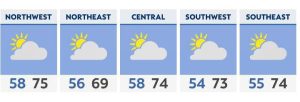Stocks shifted between small gains and losses in morning trading on Wall Street Tuesday as investors reviewed the latest corporate earnings for clues on inflation’s continuing impact.
The S&P 500 index fell 0.2% as of 11:18 a.m. Eastern. The Dow Jones Industrial Average fell 202 points, or 0.6%, to 32,594 and the Nasdaq was mostly unchanged.
Pricey technology stocks and industrial companies were among the biggest weights on the broader market. Microsoft fell 1.1% and Boeing slipped 2.7%.
Utilities and health care stocks gained ground. Intuitive Surgical rose 5.4% and NextEra Energy rose 1.2%.
The yield on the 10-year Treasury rose to 2.65% from 2.61% late Monday.
Corporate earnings remain a key focus for investors as they try to assess the health of the economy amid record high inflation, rising interest rates and recession fears.
Rideshare company Uber surged 15.1% after reporting surprisingly strong second-quarter revenue. Construction equipment maker Caterpillar fell 3.8% after the economic bellwether reported disappointing second-quarter revenue. Starbucks delivers its results later Tuesday.
Companies within the benchmark S&P 500 have been reporting mostly solid earnings, but many are also warning about weaker customer spending and higher costs because of ongoing supply chain issues. Businesses have raised prices on everything from food to clothing to maintain their profits.
Consumers are also getting squeezed by gas prices. While prices have come down recently, U.S. crude oil prices are still up 25% this year.
Central banks have been trying to rein in inflation by raising interest rates to slow economic growth. The Federal Reserve’s key short-term interest rate is at its highest level since 2018. That has Wall Street worried that the Fed could go too far and tip the economy into a recession.
Government data last week showed that the U.S. economy contracted in the second quarter, suggesting it could already be in a recession. Retail sales and other economic data show that consumers are pulling back on spending. But, recession fears have been softened by reports showing strong employment.
The Labor Department reported on Tuesday that American employers posted fewer job openings in June as the economy contends with raging inflation and rising interest rates. Openings are a still-high 10.7 million. The job market has been resilient this year, and companies have complained that it is hard to fill open positions: Employers have added an average of 457,000 jobs a month in 2022; and unemployment is near a 50-year low.
The Labor Department’s jobs report for July, out Friday, is expected to show that employers tacked on another 250,000 jobs last month.




